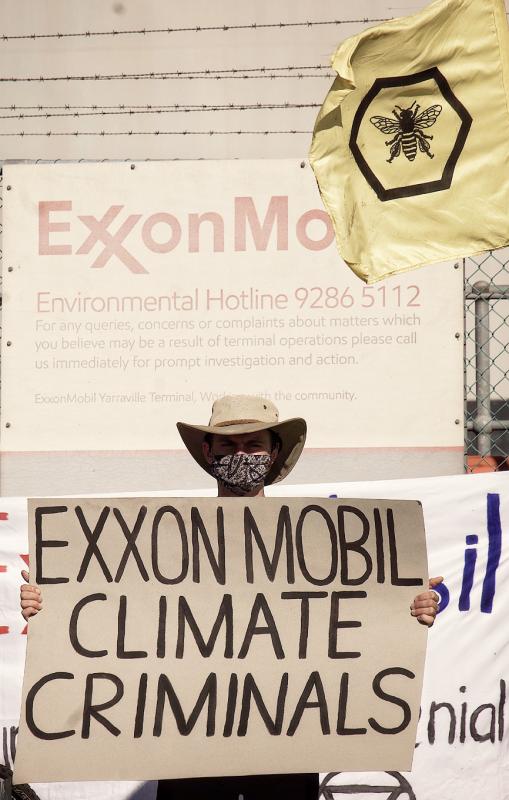Some of the world’s biggest fossil fuel companies have used advertising to “greenwash” their contribution to the climate crisis, according to files published by environmental lawyers ClientEarth.
They describe the practice as “a great deception.”
The files compare the adverts produced by ExxonMobil, Aramco, Chevron, Shell, Equinor and others with the companies’ operations and products, overall climate impact and progress toward climate-safe business models.

Photo: EPA-EFE
ClientEarth is calling on policymakers to ban all fossil fuel company ads unless they come with tobacco-style health warnings about the risks of global heating to people and the planet.
Its lawyers lodged a complaint in 2019 alleging that BP’s advertising campaigns misled the public by focusing on the company’s low-carbon energy products, when more than 96 percent of its annual spend was on oil and gas.
BP withdrew the ads before the complaint was assessed.
ClientEarth said it is now putting other fossil fuel companies on notice over greenwashing adverts.
“We’re currently witnessing a great deception, where the companies most responsible for catastrophically heating the planet are spending millions on advertising campaigns about how their business plans are focused on sustainability,” ClientEarth lawyer Johnny White said.
“We need to reduce reliance on fossil fuels, but instead of leading a low-carbon transition these companies are putting out advertising which distracts the public and launders their image,” White said. “Our research shows these adverts are misrepresenting the true nature of companies’ businesses, of their contribution to climate change, and of their transition plans.”
ClientEarth’s analysis includes claims that ExxonMobil advertising suggested its experimental algae biofuels could one day reduce transport emissions, while it has no company-wide net zero target and its 2025 emission reduction targets do not include the vast majority of emissions resulting from its products.
Saudi Arabia’s Aramco said it conducted business “in a way that addresses the climate challenge,” yet it is the world’s largest corporate greenhouse gas emitter and plans to continue exploring for more oil and gas, despite having reserves greater than those of Exxon, Chevron, Shell, BP and Total combined.
Chevron said it is “ part of the solution “ to climate change, but does not have a net zero commitment or a strategy aligned with the Paris climate agreement, and its plans for carbon capture and storage cover less than 1 percent of its 2019 carbon emissions .
Shell said it is investing in “lower-carbon biofuels and hydrogen, electric vehicle charging, solar and wind power,” but in last year it earmarked between US$2 billion and US$3 billion a year for low-carbon businesses, compared with US$17 billion on fossil fuels operations.
Norway’s Equinor has talked of growing renewable capacity tenfold by 2026 , but renewables are only planned to be 4 percent of its energy by that date.
ClientEarth said warnings on oil company adverts should state that fossil fuel products are the main cause of global heating and that companies must divulge how much they are spending on fossil fuels compared with their low-carbon businesses.

A fire caused by a burst gas pipe yesterday spread to several homes and sent a fireball soaring into the sky outside Malaysia’s largest city, injuring more than 100 people. The towering inferno near a gas station in Putra Heights outside Kuala Lumpur was visible for kilometers and lasted for several hours. It happened during a public holiday as Muslims, who are the majority in Malaysia, celebrate the second day of Eid al-Fitr. National oil company Petronas said the fire started at one of its gas pipelines at 8:10am and the affected pipeline was later isolated. Disaster management officials said shutting the

UNREST: The authorities in Turkey arrested 13 Turkish journalists in five days, deported a BBC correspondent and on Thursday arrested a reporter from Sweden Waving flags and chanting slogans, many hundreds of thousands of anti-government demonstrators on Saturday rallied in Istanbul, Turkey, in defence of democracy after the arrest of Istanbul Mayor Ekrem Imamoglu which sparked Turkey’s worst street unrest in more than a decade. Under a cloudless blue sky, vast crowds gathered in Maltepe on the Asian side of Turkey’s biggest city on the eve of the Eid al-Fitr celebration which started yesterday, marking the end of Ramadan. Ozgur Ozel, chairman of the main opposition Republican People’s Party (CHP), which organized the rally, said there were 2.2 million people in the crowd, but

The US government has banned US government personnel in China, as well as family members and contractors with security clearances, from any romantic or sexual relationships with Chinese citizens, The Associated Press (AP) has learned. Four people with direct knowledge of the matter told the AP about the policy, which was put into effect by departing US ambassador Nicholas Burns in January shortly before he left China. The people would speak only on condition of anonymity to discuss details of a confidential directive. Although some US agencies already had strict rules on such relationships, a blanket “nonfraternization” policy, as it is known, has

OPTIONS: Asked if one potential avenue to a third term was having J.D. Vance run for the top job and then pass the baton to him, Trump said: ‘That’s one,’ among others US President Donald Trump on Sunday that “I’m not joking” about trying to serve a third term, the clearest indication he is considering ways to breach a constitutional barrier against continuing to lead the country after his second term ends at the beginning of 2029. “There are methods which you could do it,” Trump said in a telephone interview with NBC News from Mar-a-Lago, his private club. He elaborated later to reporters on Air Force One from Florida to Washington that “I have had more people ask me to have a third term, which in a way is a fourth term